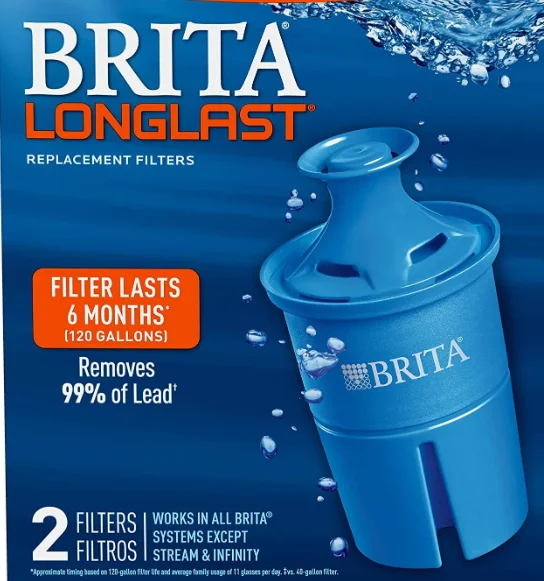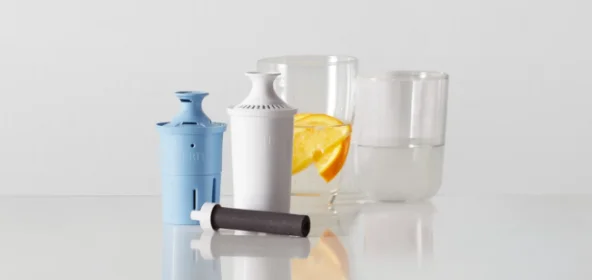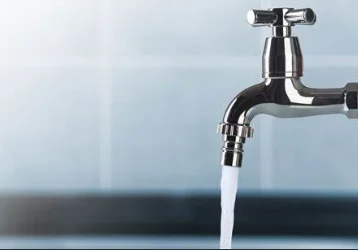Yes, just like any other activated carbon filter, Brita filters can remove Chloramine from water.
However, removing over 95% of chloramine takes more time than thought since water needs to be in contact with the activated carbon filters for longer. While Brita Company does not lay express claims on their effectiveness, these filters do remove some Chloramine.
Talking about Chloramine and water pitcher filters, two things seem to unfold.
One, it requires six minutes of charcoal exposure to remove Chloramine. There isn’t any water pitcher filter that will allow charcoal contact to be so high. You might run water through this filter many times to get rid of the Chloramine.
However, it might not remove all the Chloramine, and this can be tedious to repeat this process every time you need a drink of water. In such a case, you can adopt other methods of water purification as discussed in this guide.
Two, charcoal will remove chlorine from water, but leave the ammonia, which is simply exchanging one problem to another.
Also Read: Does reverse osmosis remove fluoride from water
What
are Brita Filters?

They are kettle, tap, and jug attachments with detachable disposable filters. These filters can also be recycled. Their main filtering mechanism is made up of ion-exchange resin and activated carbon. The activated carbon is made from coconut shells.
Summary
of the Company behind Brita Filters
The company that produces Brita filters is located near Wiesbaden in Taunusstein, Germany.
It has production facilities in Switzerland, Italy, China, the United Kingdom, and Germany. The Brita company was founded by Heinz Hankammer in 1963, and he named it after his daughter.
The Company Clorox in Oakland, California, got into a distribution-and-licensing contract with the company from Germany for South and North America in 1988. In 1995, it included Canadian rights through acquiring Brita International Holdings in Canada.
In the year 2000, Clorox acquired all the brand’s rights in the Americas, and Brita came into an agreement of non-compete clause up to 2005. However, in 2008, Brita went back to the North American market and started working under the Mavea brand, but withdrew in 2016. However various products are sold in America through the Brita brand.
How Brita Filters Remove Chloramine from water
Brita filters do filter Chlorine and Chloramine from water through carbon filtration. According to Brita, the filters are effective in two ways.
- Substances that may impair the taste, such as chlorine compounds and chloramines are
removed by the activated carbon. - The ion-exchange resin minimizes carbon hardness and also leads and copper.
According to a test done to ascertain how much Chloramine Brita filter was removed, the tests were done on filtered tap water and unfiltered tap water. The tests showed the free chlorines and total chlorines filtered by the Brita filter, to determine the total chlorine and free chlorine subtracting the latter from the former to get the Chloramine per million in parts.
The test showed that the free chlorine was 0.0, total chlorine was 0.15 after subtraction the number of Chloramines removed was 0.15, indicating that Brita removed 90% of Chloramine. The pitcher type of Brita filters uses activated carbon technology, which means your water, runs across loose carbon granules.
Depending on the type and quality of the charcoal filter, positive charge traps and attracts impurities and chemicals. While this is a positive result, it may not be conclusive if the Brita filters for sure do remove Chloramine from water.
Also Read: Does lemon remove fluoride from water?
What Type of Filters Do Brita Filters Have?

Brita the German brand is the best-known producer of water filter pitchers. I will discuss a few types of Brita brand water filters below.
- Everyday- It is an affordable filter with basic features designed for use daily.
Since it does not have any digital filter reminder, the users are asked to
monitor the number of refills or replace the filter every two months. The
design is easy to use and simple. The lid on top of this filter does not lock in
place; therefore pouring water should be done carefully. The company is
planning on releasing Everyday pitchers that have covers that will fit tightly. - The Filters- this model makes use of Brita’s dispenser filters and standard pitcher
so that clients will get the results of Brita filtration at a good price, the
filters are bought in multi-packs and are readily available. It is not necessary to soak today’s Brita
filters; what is necessary is to run the filter for 15 seconds under tap
water.
This filter has activated carbon created from coconut shells. The proprietary media eradicates the smell of chlorine and the taste as well as organic contaminants. White ion exchange granules combine with carbon. These polymer beads possess a huge surface area which helps to remove heavy metals and metals found in the drinking water.
Brita recommends alternating the filter every forty gallons of use or after every two months. The pitcher has a capacity of 10 cups; hence the filter ought to be alternated after 64 refills
What Substances Do Brita Filters Remove From Water
In water filtration, Brita is a well-known name and offers a wide range of home products that are designed to remove minerals, impurities, and chemicals from drinking water. Brita filters apply the combination of an ion-exchange resin and activated carbon in their tap extensions, water jugs as well as other filtration products. These objects work with each other to remove several materials from water. Some of the substances they remove from water are:
1. Calcium
Calcium floats in water naturally, due to the exposure that happens between the piles of earth crust and the water supply. Calcium’s concentration varies largely, depending on the origin of the water supply. The concentration of calcium in water is generally high, which can affect the taste negatively.
Scales can form on water jugs due to the high concentration of calcium over time. Brita filters remove calcium from the water safely as the water pours through the filter, enhancing the texture and taste of the water
2. Magnesium

Magnesium is another mineral found commonly in water supplies, it contributes greatly to the hardness of water, due to the quantity of alkali earth ions found in the water.
It is often washed off from the rocks and absorbed into the water supplies. It is also present in most fertilizers and various minerals.
Excess fertilizer frequently flows into the local water supplies dispensing magnesium in the water; however, magnesium isn’t toxic unless its doses are high in the water. Brita filters remove magnesium from the drinking water, improving the taste. More still, you easily filter heavy metals like magnesium from water using easy but effective methods.
3. Chlorine
Chlorine is usually placed in the water supplies purposely due to its disinfectant properties. This way, it is used to disinfect well water before it reaches the tap. Since chlorine is considered toxic to bacteria and germs, it’s used to destroy microorganisms in water before it is used for drinking.
However, when it is in high doses it is harmful to humans. Breathing in of chlorine will cause respiratory problems, difficulty in breathing, and coughing. Learn more about how to dechlorinate water at home in the guide about how to purify water.
Although chlorine concentration is rarely high in drinking water, Brita filters eliminate chlorine after the drinking water has been disinfected, allowing you to enjoy both worlds best.
4. Lead
When humans are exposed to lead over time, it can be lethal. Exposure to lead for a long time causes kidney problems, the brain, and the nervous system, with pregnant women and children being the most endangered. Lead is often a problem in older homes that have lead pipes.
In addition, Lead gets off the pipes and gets absorbed into the water. Faucets are also a source of contamination of lead because chrome-plated faucets have up to eight percent lead. However, the lead is pulled out through a filtration process by Brita filters.
Also Read: Best stainless steel Kitchen sinks that don’t scratch: Resistant
Final Take
From the write-up above, we have seen that Brita filters do remove impurities, metals, and organisms from your drinking water. Brita filters are also the best in the market with a competitive and affordable price. For $20 you can have up to 40 gallons of purified water every two months hence stay away from toxic chemicals germs and bacteria.

I am a homeowner excited by various innovative products and solutions that make life better. I am happy to share such ideas and reviews of home and related products.